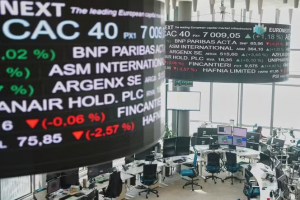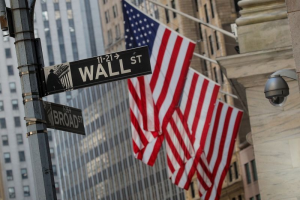AI darling Nvidia is reporting quarterly results, the crypto rally rolls on, the UK is to release inflation data and oil prices look set to remain on the back foot. Here's your look at what's happening in markets for the week ahead.
1. Nvidia results Chipmaker Nvidia (NASDAQ:NVDA), a bellwether for the AI craze that has boosted stocks this year is due to report third quarter earnings after the close on Wednesday.
The results could well be a gauge for investors’ appetite for tech stocks, the AI trade and sentiment for equities broadly, after a post-election market rally stalled.
Nvidia’s chips are seen as the gold standard in the AI-space and its shares have risen around 200% this year, overtaking Apple (NASDAQ:AAPL) to become the world's largest company by market capitalization. Its outsize weighting in the S&P 500 has helped power the index to record highs this year.
Investor expectations are high going into earnings, raising the chances for short term volatility.
Last week analysts at Raymond James raised their Nvidia price target from $140 to $170 and reiterated that “any pullback due to high expectations [is] an opportunity.”
2. Crypto rally Bitcoin’s price has surged 30% since the Nov. 5 U.S. election, rising above the $90,000 level for the first time, amid a rally that shows no signs of stopping.
The entire cryptocurrency market cap has risen above $3 trillion in value for the first time ever, which means that Bitcoin and other digital assets are currently worth as much as the combined market cap of Elon Musk's Tesla (NASDAQ:TSLA), Facebook (NASDAQ:META) parent Meta and Warren Buffett's Berkshire Hathaway (NYSE:BRKa).
The rally is being driven by expectations of a more favorable regulatory environment under the Trump administration and with momentum continuing to build, some analysts see a six-figure bitcoin price as increasingly likely.
A one-time crypto skeptic, President-elect Donald Trump has pledged to set up a national Bitcoin reserve and make the U.S. a global hub for the industry but it remains to be seen how feasible his promises are and what the timeline will be for their implementation.
3. U.S. data, Fedspeak The U.S. economic calendar is quieter in the week ahead, but investors will get updates on the health of the housing sector, with reports on building permits, housing starts and existing home sales.
The calendar also includes the weekly report on weekly jobless claims, while manufacturing and service sector PMI data on Friday could give early indications on how companies are reacting to the threat of Trump's proposed trade tariffs - a data point that will be closely watched by markets from here on.
Elsewhere, earnings results from Walmart (NYSE:WMT) and Lowe’s (NYSE:LOW) on Tuesday will give fresh insights into the strength of consumer spending.
Investors will also get the chance to hear from several Federal Reserve officials, including Chicago Fed President Austan Goolsbee, Kansas Fed President Jeffrey Schmid and Cleveland Fed President Beth Hammack.
4. Oil prices Oil prices ended around 2% lower on Friday, adding to losses for the week as a combination of fears over weakening demand from China and the prospect of a slower pace of Fed rates cuts weighed.
For the week, Brent fell around 4%, while crude futures declined around 5%.
Data on Friday showed that Chinese refineries processed less crude in October on a year-over-year basis as domestic demand slowed, adding to fears over the economic outlook of the world's largest crude importer.
Earlier in the week, the International Energy Agency forecast that global oil demand will slow, leading to an oil surplus in 2025.
Meanwhile, Fed Chair Jerome Powell indicated Thursday the central bank can afford to be careful with the future pace and scope of rate cuts, citing ongoing economic growth, a solid job market, and inflation above the Fed’s 2% target.
Lower interest rates typically spur economic growth, aiding fuel demand.
5. UK inflation The UK is to release October CPI data on Wednesday with economists expecting the annual rate of inflation to have risen 2.2%, climbing back above the Bank of England’s 2% target.
That would be an increase from 1.7% in September, the first time the annual rate of inflation dropped below the BoE’s target in more than three years.
The BoE delivered a second 25-basis point rate cut earlier this month and said further cuts were likely to be gradual as it assessed the persistence of inflation pressures including from the first budget of Britain's new government.
BoE Governor Andrew Baily along with several other officials will appear before Parliament's Treasury Committee on Tuesday to answer questions on inflation and the monetary policy outlook.
The UK is to release October retail sales data on Friday along with manufacturing and service sector PMI data.













